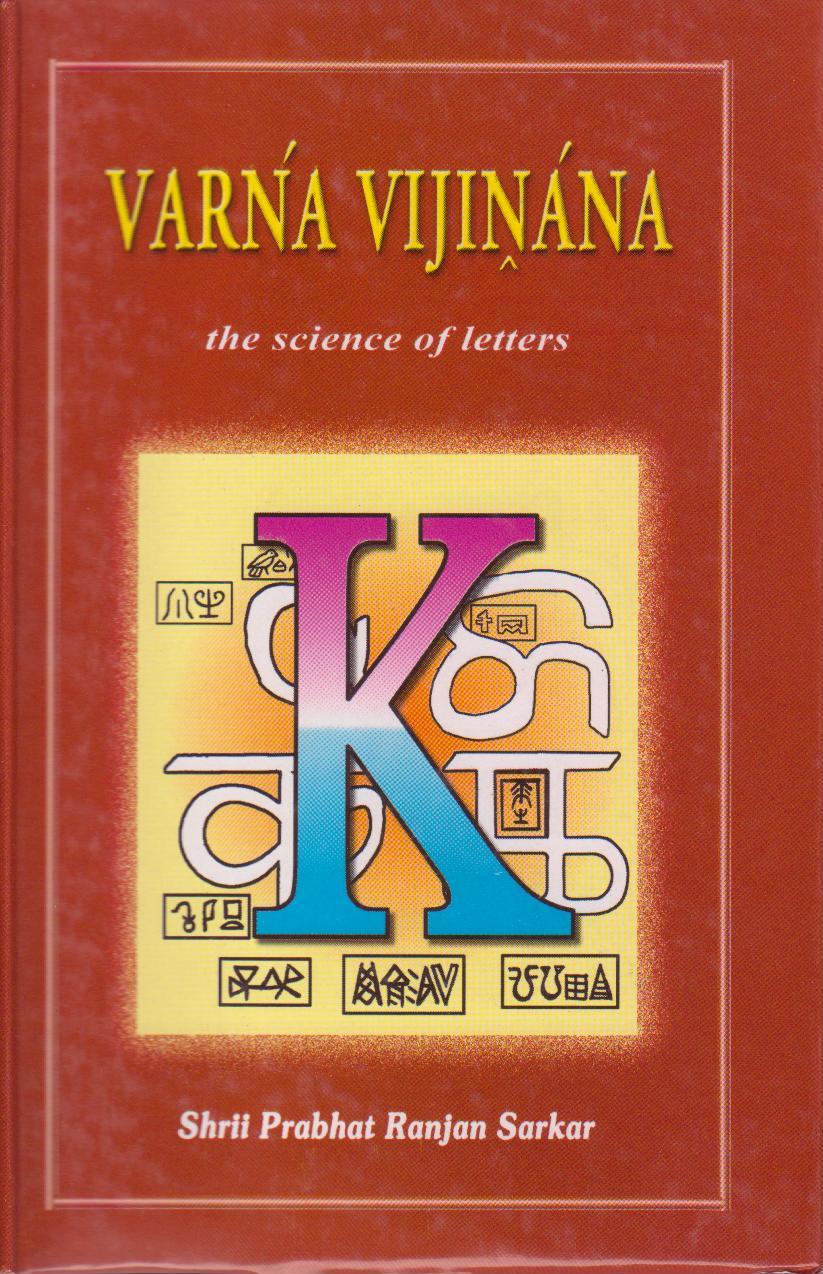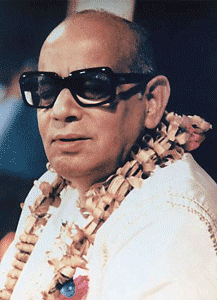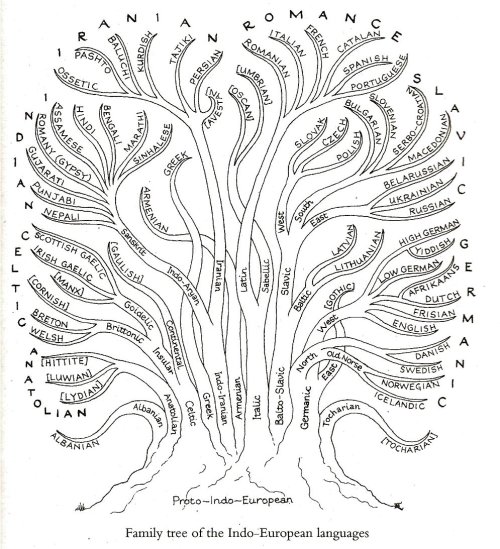
Some years ago, I had the pleasure of living six months in an Ananda Marga community. Ananda Marga is a yoga organization founded in India in 1955 and their followers are now spanning the globe, practicing yoga and meditation and abstaining from various things ranging from the obvious (alcohol and meat) to the more peculiar such as dark chocolate, onions or drinking while standing upright.
I found them to be bright and positively minded people, and although it would never occur to me to become a follower I believe for those who want their way to be led, this is absolutely not the worst club to join.
 |
| P. R. Sarkar, or Baba. |
Baba was born as Prabhat Ranjan Sarkar in Bihar, India in 1921 and died in 1990, contrary to his own preceding statements. Like most gurus he claimed to have tapped into The Divine and acquired infinite knowledge. So in between his daytime job at a railway station and authoring numerous books on yogic exercises and vegetarianism (which, by all accounts, he seemed to know a lot about), he also wrote scores of books on practically every established scientific discipline, including sociology, literature, cosmology, medicine and microbiology—which, I suspected from early on, he maybe did not know so much about.
According to the various books’ forewords, the droplets of divine wisdom from this spiritual superman would give the established scientific community food for thought for decades to come and contribute greatly to the advance of mankind. (In addition to this, he could also levitate, control the weather telepathically, and utilize X-ray vision from behind his thick-rimmed glasses.)
Statements like that do invite scrutiny, so I have taken the liberty of looking closer at one of the books defining guru Sarkar as a world class academic. As I don’t know much about cosmology or medicine (and mind you, neither do I pretend to), I chose the book Varńa Vijiṋána: The Science of Letters, published by Ananda Marga Publications in Anandanagar in 1983. The subject is linguistics, which I do know a little bit about. The blurb somewhat fuzzily claims that the book...
…binds the myriad and often mystifying threads of language into a single tapestry and demonstrates with remarkable clarity how they obey the laws of pure science. (…) Many of the ideas that inform these discourses are new to the study of linguistics and are sure to provide ample material for future research.
Linguistics does indeed follow the laws of science. And yes, I can confirm that this book is based on some “new ideas”—Far, far from science.
Already on page one, Sarkar ascertains that the Vedic language is the oldest in the world and its script is the first one invented, right after people lost their tails and began using their arms instead. He conviently ignores Old Egyptian, Sumerian, Babylonian, Hittite and Hebrew, to name a handful of written languages who precede Vedic Sanskrit by more than 2000 years (And who were also not spoken by early primates).
Sarkar then goes on to explain etymology and how the English word “daughter” derives from the Latin “duhitar” (p. 9) and “knife” from the French “kanife” (p. 24). (None of these words exist in any other source. In fact daughter and knife are both clearly of a common Germanic origin.) And in passing he shows off by mapping out the Latin language family from his memory:
The Latin family of languages has three branches: Continental Latin, Occido-Demi-Latin, and Oriento-Demi-Latin. Continental Latin includes German, Czech, Hungarian, Polish, Finnish, and so on. Occido-Demi-Latin includes two and a half—Spanish, Portuguese and Basque. Basque can be called a half-language because it is a mixture of Portuguese and Spanish. Oriento-Demi-Latin includes French and Italian. (…) There are two pairs of languages on this earth which are very similar to one another: Spanish and Portuguese, and Bengali and Oriya. (p. 32)
 |
| An actual language family tree. |
He concocts brand new language families, among them a group of Latin languages consisting of German, Czech/Polish and Finnish/Hungarian. According to everybody else on the planet, they are Germanic, Slavonic and Ugric languages, respectively. The two former are remotely related, the latter is not at all. The only major European language group not represented in this “Contitental Latin” branch is—the Latin languages.
The next surprise was Sarkar’s description of the infamously mysterious Basque language, which has no known relatives at all. Least of all is it a 50/50 mix of Spanish and Portuguese.
And finally I doubt he'll find support for the claim that there are only two pairs of closely related languages in the whole world. But I suppose in a system where German, Czech and Finnish are close relatives, Spanish and Portuguese will seem eerily alike. But I must point out that I find Sarkar contradicts himself, as he later points out other very similar languages. In fact, some are so similar that they only differ in two specific words:
The Scottish and English languages are very closely linked. In Scottish, however, the pronunciation of “r” and “l” is indistinct. For example, the Scottish people pronounce the English world “gold” a bit like “gode”. The correct English pronunciation of the word “Edinburg” is edinbárg while the Scottish pronunciation is edinvará. The people of England have accepted the edinvará pronunciation. Apart from these small differences the Scottish and English languages are practically the same. (p. 67)
There are several levels, and decades, to the debate of whether Scots is a language or a dialect. In this case, however, it is quite clear that Sarkar describes Scottish Standard English, if not just ordinary English. (An indistinct “r” is not exactly a hallmark of Scottish English.) No wonder, then, that in this cocoon of divine clarity, the Scots are also responsible for inventing the name London:
The huge city in the south of England used to be called Londres in France, but because the people of Scotland could not pronounce it properly, and for other reasons as well, the city was called Lándán. Nowadays the word Lándán was changed into London. (p. 189)
And the book goes on like this, with plenty of droplets and the occational shower of “unique insights”. The most picturesque etymology offered is one that I feel I have to quote in all its absurd length, so bear with me:
Many people think that the English word “mango” comes from the Tamil word máungá but it has not. (…) There is a different reason why what we call ám in Bengali is called “mango” in English. Once there was a gentleman by the name of Mr. Ricecurry who came to work in this country during the rule of the East India Company. He was the first English gentleman to bring his wife with him. Both Mr. and Mrs. Ricecurry were responsible for introducing many Bengali as well as North Indian words into the English lexicon. It is said that the night the missus heard an owl-call for the first time she was so shaken by it that she cried out several times “horrible, horrible”. She asked the maid: “Was that the sound of the famous Royal Bengal tiger of the Sundarban jungle?” The maid replied: “No, ma’am, that was an ullu (ullu in Urdu means “owl”). Then the missus said, “Oh, horrible, its name is ‘owl’?” Thus the Urdu word ullu entered the English lexicon in altered form as “owl”.
When the mango-seller would pass by the house of Mr. Ricecurry, Mrs. Ricecurry would not be able to restrain herself from buying that delicious fruit. Right away she would tell her orderly: “Man, go go …,” that is, go and call the mango-seller. The orderly started to think that perhaps the lady was calling the fruit “mango”. Thereafter on his own the orderly used to tell the missus “mango, mango” when he would see the mango-seller. In time this “mango” became the English synonym for ám. (pp. 48-49)
I do not know if this is a common myth (or perhaps a simple pun) in India. But the notion that the first British woman to visit India would be called “Mrs. Ricecurry” and had never heard of owls is simply ridiculous.
As for “mango”, the first known use of the word in English was in 1582—years before the East India Company was founded. According to both the Oxford and the Merriam-Webster dictionaries, the word entered English via Portuguese traders, who picked it up from Tamil or Malayalam. The two are closely related Dravidian languages, and the original māngāy means “the fruit or seed (kāy) of the mān tree”. It has nothing to do with men going anywhere.
 |
| This fruit is not a pun. |
It's fully understandable that people want to be best at everything. We all love a renaissance man, and even more so if we get to be one. But very few people come out looking very clever by pretending to. If you’re a great vegetarian gymnast with a worldwide following, there’s no need to say you’re a leading scientist or a flying X-ray machine to top it off. But then again, I guess that's how religion works. If you have a worldwide following, naturally you also have the possibility of awing them with whatever you can make up on the spot. And I'm sure that's very, very tempting.
And maybe I'm just naive to think that somebody could gain a worldwide following in the first place just because they're very good at eating broccoli and sitting still for hours.
Sarkar did not seem inclined to stick to what de did best. According to the foreword, after finishing his first (and allegedly very successful) book on language he “embarked upon an eight volume series (…) and after that a tweny-six volume series (that) comprises a body of work that is unsurpassed in the field of linguistic studies.” I'm ready to believe the “unsurpassed” bit.
I remember asking one of the followers—a very bright and highly educated guy—if he really believed that Baba could fly or control the weather or that Finnish (which he spoke) was related to Polish. He gave me a resigned look and said in a monotone voice as if he had said it a million times before, “Yes I do. Now, can we talk about something else?” The benefits of a healthy diet, meditation and exercise were evident in this strong and calm young man. As were the drawbacks of compromising with a rigorous belief system entombing one man’s delusions. But at least he knew this, and in a way it was not a bad answer. I felt he had picked the good from the bad and found something in there that benefitted him without being duped—just occationally annoyed.
I also asked another one, who said I was correct according to Western scientific traditions. But these do not have a spiritual basis, and so they could not be called complete: “It may seem like you are right, but in time Baba’s information will prove correct,” he said. This answer scared the shit out of me. Not so much because I believed him, but because he obviously believed it himself.
So today’s life lesson is: If you find a religion if that suits you, be my guest. But please, please do not believe everything they tell you.
